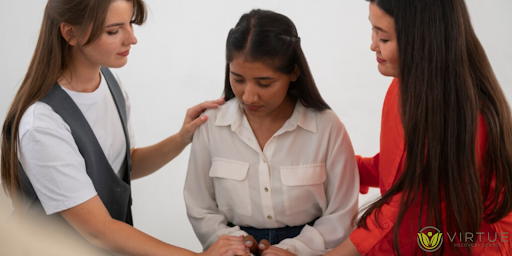Key Takeaways
- Rehabilitation for alcohol helps individuals handle social pressure triggers effectively.
- Group therapy and residential programs provide support and teach coping strategies.
- Recognizing triggers before social events reduces the risk of relapse.
- Combining therapy with structured care improves emotional resilience and overall health.
- Early intervention and education enhance long-term recovery outcomes.
Introduction
Social situations often create strong pressure to drink, even for people committed to sobriety. Parties, work events, or family gatherings can all become challenges for maintaining control. For individuals struggling with alcohol dependence, these triggers can quickly lead to relapse. Rehabilitation for alcohol programs provides the tools, guidance, and structured environment to navigate these situations safely.
Through supervised care and therapy, patients learn to identify personal triggers, manage cravings, and develop healthy coping mechanisms. The goal is not only to stop drinking but also to rebuild confidence and regain control over life, even in social contexts where alcohol is prevalent.
How does social pressure influence drinking behavior?

Humans naturally respond to social cues, and peer influence plays a significant role in behavior. For someone struggling with alcohol use, even subtle pressures, like a friend offering a drink, can prompt consumption. Studies show that exposure to social drinking situations increases the likelihood of relapse.
These pressures are not always obvious. Subtle expectations, cultural norms, or unspoken rules can lead to drinking. Recognizing these triggers is the first step in preventing relapse. Rehabilitation programs help individuals become aware of these situations and develop strategies to avoid falling back into old patterns.
Why is rehabilitation for alcohol essential for social triggers?
Structured rehab programs provide a safe space away from the pressures of daily life. Residential programs create an environment where patients can focus on recovery without immediate access to alcohol.
Rehabilitation combines therapy, counseling, and educational sessions to teach skills for managing cravings and social stress. Understanding personal triggers helps patients develop alternative behaviors. Over time, these skills become second nature, making it easier to handle real-life social situations.
How does group therapy support recovery?

Group therapy is an essential component of rehabilitation for alcohol. It provides a supportive network where individuals share experiences, challenges, and successes. Being part of a group helps patients feel understood and reduces isolation.
During sessions, participants discuss strategies for handling social pressures and practice refusal skills. Group members encourage each other, offer advice, and celebrate milestones together. This collective approach strengthens motivation and builds accountability, which is crucial for long-term recovery.
What other therapies complement rehabilitation for alcohol?
In addition to group therapy, other approaches like cognitive-behavioral therapy (CBT), mindfulness practices, and stress management are used. These therapies address underlying issues such as anxiety, depression, or past trauma, which can amplify vulnerability to social triggers.
Studies highlight that combining behavioral therapy with structured rehab programs significantly reduces relapse rates. Therapy also helps individuals build resilience, improve emotional regulation, and replace unhealthy coping mechanisms with positive behaviors.
How does alcohol affect the body and mind?
Alcohol impacts nearly every system in the body. Chronic use can damage the liver, heart, and brain. It may also affect memory, decision-making, and mood regulation. Physiologically, alcohol disrupts sleep, reduces energy, and contributes to weight changes.
Understanding these effects can motivate patients to commit to recovery. Comprehensive rehabilitation for alcohol addresses both physical and psychological health. Nutrition, exercise, and therapy support the body’s healing while strengthening mental health.
Can patients maintain sobriety after rehab?
Yes. By practicing strategies learned in rehab, patients can handle social situations without relapsing. Techniques like assertive communication, mindfulness, and avoidance of high-risk environments are reinforced in therapy sessions.
Aftercare programs, such as outpatient therapy or peer support groups, provide ongoing reinforcement of these skills. This continued engagement helps maintain sobriety while navigating daily life and social interactions, ensuring recovery is sustained over time.
How does early intervention improve outcomes?
Seeking help early, before social triggers lead to repeated relapse, greatly improves recovery success. Rehabilitation programs offer structured care and education, helping patients understand their patterns and adopt healthier routines.
Early intervention reduces long-term health risks, strengthens emotional resilience, and equips individuals with tools to manage stress, cravings, and social challenges effectively.
YouTube Insight
Watch What’s Depersonalization & Derealization From Alcohol Addiction? to understand how alcohol affects perception and why professional rehab is essential.
Conclusion
Social pressure is a significant challenge in alcohol recovery, but rehabilitation for alcohol equips patients with the tools to manage triggers effectively. Programs combining residential rehab with group therapy and individualized counseling strengthen mental, emotional, and physical health.
Take the first step toward a safer, healthier recovery by contacting Virtue Recovery Houston at 713-234-6254. Professional guidance ensures you can navigate social situations confidently and maintain long-term sobriety.
FAQs
What is rehabilitation for alcohol?
A structured program providing therapy, support, and skills to resist alcohol in social situations.
How does group therapy help with social triggers?
It offers peer support, shared experiences, and strategies to handle cravings and avoid relapse.
Can rehab prevent relapse at social events?
Yes, by teaching coping techniques and building confidence in managing peer pressure.
Is residential rehab necessary?
It provides a safe environment to practice coping skills without alcohol exposure.
How long does rehabilitation take?
Programs typically range from 30 to 90 days, depending on individual needs and progress.
Resources
- PMC. Social Pressure and Alcohol Use. 2019. https://pmc.ncbi.nlm.nih.gov/articles/PMC6760383/
- PMC. Behavioral Interventions in Alcohol Rehab. 2021. https://pmc.ncbi.nlm.nih.gov/articles/PMC8104924/
NIAAA. Alcohol’s Effects on the Body. 2023. https://www.niaaa.nih.gov/alcohols-effects-health/alcohols-effects-body








